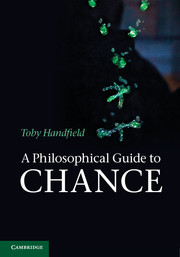Book contents
- Frontmatter
- Contents
- Preface
- 1 The concept of chance
- 2 The classical picture: What is the world made of?
- 3 Ways the world might be
- 4 Possibilities of thought
- 5 Chance in phase space
- 6 Possibilist theories of chance
- 7 Actualist theories of chance
- 8 Anti-realist theories of chance
- 9 Chance in quantum physics
- 10 Chance in branching worlds
- 11 Time and evidence
- 12 Debunking chance
- References
- Index
4 - Possibilities of thought
Published online by Cambridge University Press: 05 June 2012
- Frontmatter
- Contents
- Preface
- 1 The concept of chance
- 2 The classical picture: What is the world made of?
- 3 Ways the world might be
- 4 Possibilities of thought
- 5 Chance in phase space
- 6 Possibilist theories of chance
- 7 Actualist theories of chance
- 8 Anti-realist theories of chance
- 9 Chance in quantum physics
- 10 Chance in branching worlds
- 11 Time and evidence
- 12 Debunking chance
- References
- Index
Summary
In the previous chapter we examined phase space as a way of representing mechanical possibilities. These are the ways the world might be, assuming something like the classical picture is correct, and assuming that the world contains a certain number of particles.
Phase space does not capture all of the possibilities, but it is – I suggest – a useful set of possibilities for certain purposes. In this chapter, I want to focus on the limitations of phase space, and similarly constructed spaces of possibilities. Knowing the limits of these approaches, we'll be better placed to use them with confidence in an analysis of chance.
Propositions in phase space
Typically, when we entertain thoughts about the world, it is not in the same degree of detail as the highly specific possibilities that were introduced in the previous chapter. For instance, we might wonder about whether or not there is an elephant in the room. If we try to identify, in terms of mechanical possibilities, which mechanical possibility correlates with an elephant being in the room, then we find that there is a mismatch between the specificity of our thoughts and the mechanical possibilities. There are lots of different mechanical ways you can arrange particles in space so as to have an elephant in the room. So what might have seemed like ‘one’ possibility turns out to correspond to many different mechanical possibilities.
- Type
- Chapter
- Information
- A Philosophical Guide to ChancePhysical Probability, pp. 62 - 71Publisher: Cambridge University PressPrint publication year: 2012



